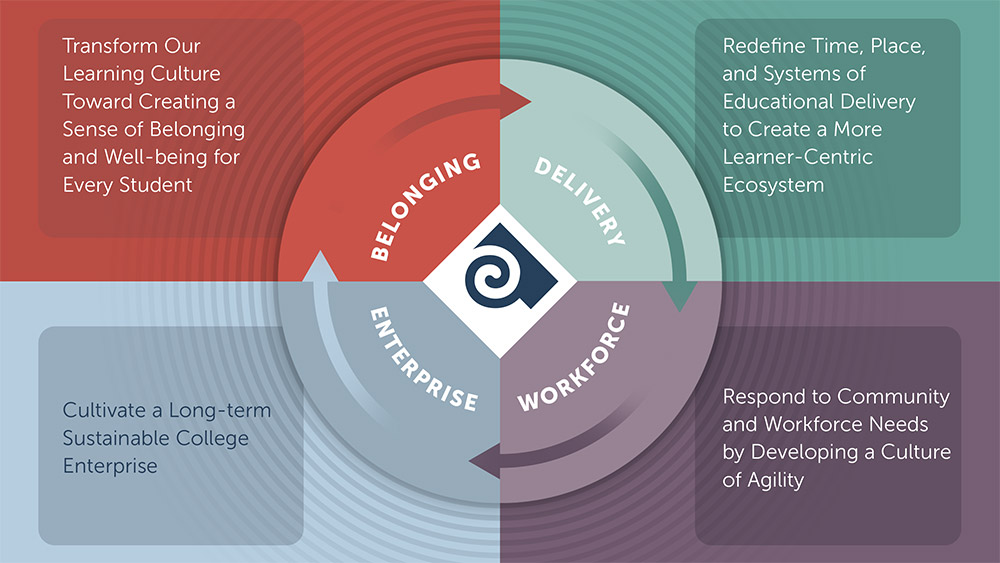This content was published: January 13, 2022. Phone numbers, email addresses, and other information may have changed.
The $18.2 million from the Disability Innovation Fund will enhance educational, economic mobility
Photos and story by James Hill
Oregon Vocational Rehabilitation (VR) is one of eight programs across the nation that has been awarded an $18.2 million Disability Innovation Fund Program. The statewide Pathways to Opportunity consortium led by Portland Community College is part of the project and will be partnering with VR to coordinate activities with Oregon’s 17 community colleges.
The funds will be used to plan, develop and implement the Inclusive Career Advancement Program (ICAP) Project.

The Strategic Plan: Belonging
The 2020-2025 Strategic Plan prepares the college for the future of higher education. Part of the plan is creating a sense of belonging and well-being for every student. This means PCC works to ensure every student has the opportunity to key resources, new employees have a sense of belonging, all staff develop intercultural competencies, and the college supports a culture where employees feel acknowledged, inspired and supported.
“PCC will lead the community of practice by providing opportunities for cross-sharing best practices, building a streamlined approach to program implementation across all 17 community colleges, while also ensuring local flexibility to meet the needs of students,” said Elizabeth Guzman Arroyo, director of PCC’s STEP & Pathways to Opportunity programs. “Ultimately, fostering a culture of continuous learning and program enhancement centered in equitable student wrap-around career coaching, academic programs, and support services that increase educational opportunity and economic mobility.”
ICAP will tap into Oregon’s current statewide network of career pathway services to advance educational and economic equity for people with disabilities, with intentional outreach and inclusion of marginalized communities.
As part of the grant, ICAP will:
- Serve 500 people with disabilities, with intentional outreach being made to marginalized communities.
- Braid together career readiness and workforce development partners across the state and Oregon’s 17 community colleges.
- Use student-centered and evidence-based strategies and practice in workforce development.
Last spring, in partnership with VR and Cornell University, Pathways to Opportunity jointly developed an application for this grant. Cornell will evaluate the project’s implementation and performance to determine efficacy of ICAP’s practices and strategies. These findings will be shared nationally to expand access and opportunities for people with disabilities to enter and be supported in their career goals.
ICAP will braid the support and services of VR, Self-Sufficiency Programs, Workforce Innovation and Opportunity Act workforce partners, Oregon Commission for the Blind (OCB) with the three interrelated and foundational initiatives of Oregon’s 17 community colleges – Career Pathways, SNAP Training and Employment Program, Pathways to Opportunities and Oregon Department of Human Services.
What is Pathways to Opportunity?
Even before the coronavirus pandemic, many students were struggling. College credentials, the most proven pathway out of poverty, remain out of reach for too many students, due to the staggering unmet financial need and basic needs insecurity.
Working together to address these issues is the Pathways to Opportunity coalition, which includes Partners for a Hunger Free Oregon, public colleges and universities, and the Oregon Department of Human Services, among other key partners.
It aims to close opportunity gaps and increase economic mobility by expanding the federal, state, and local resources available to low-income students so more people can attend and complete college. PCC has its own Pathways to Opportunity (PTO) Council, which is charged with leading the college’s work related to addressing students’ unmet financial needs – housing, food, childcare, healthcare, etc. These are key barriers to completing college for many students, disproportionately impacting students of color.
In 2021, the Oregon Legislature passed a bill that establishes a benefits navigator on every public college and university campus in Oregon. Once brought on board, the navigators will help students access federal aid like SNAP, child care, housing and much more. Students are leaving thousands of dollars in federal benefits and resources on the table. A benefits navigator ensures students access all the benefits they qualify for.
“A student I worked with went from housing insecure to a four-point GPA this term and just landed a job,” said PCC College Success Coach Heather Smith. “That’s all based on having SNAP and program support.”
